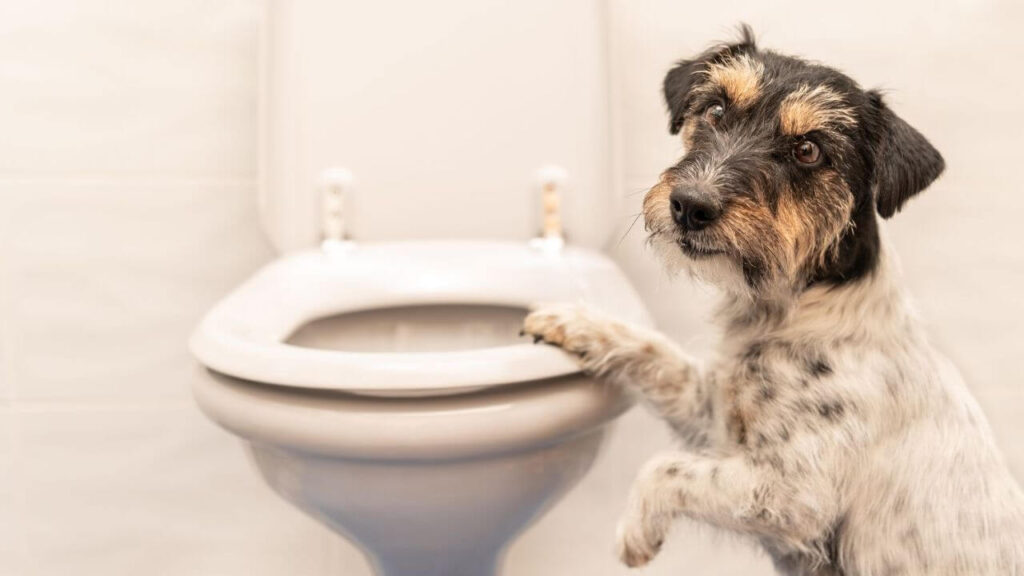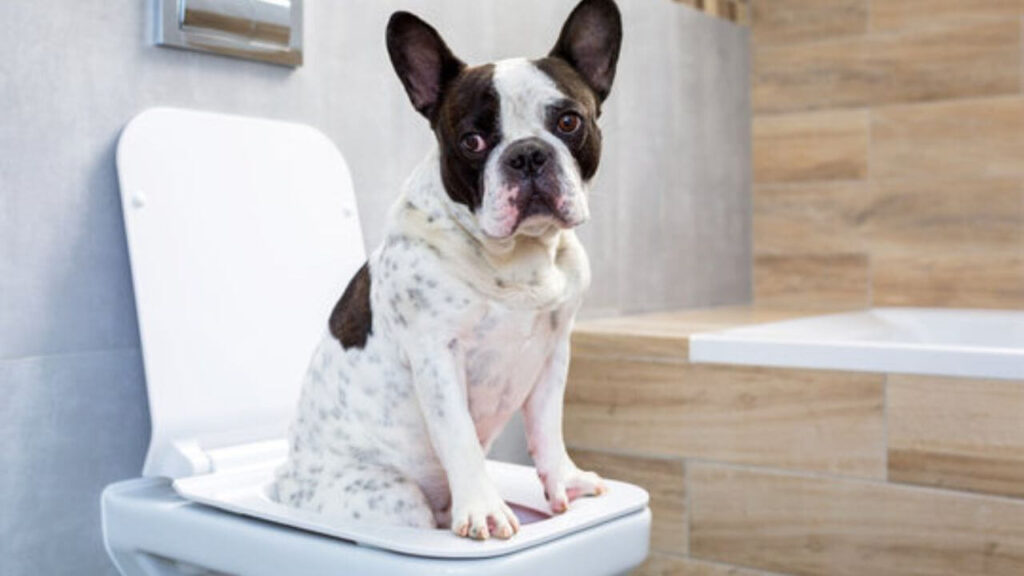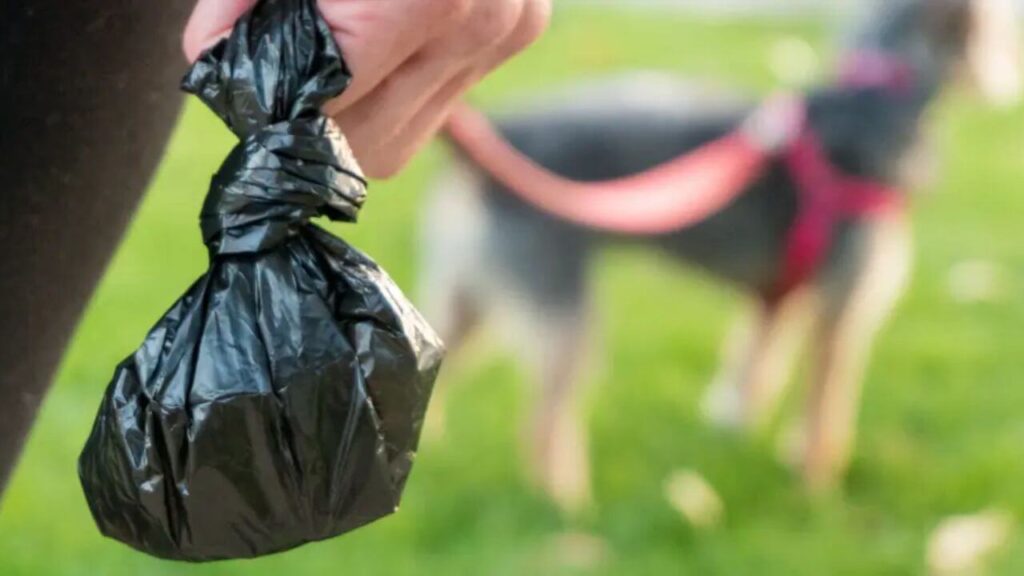When I first got a dog, I wondered if I could flush dog poop down the toilet as a convenient disposal method.
However, after some research and learning from others’ experiences, I quickly realized that it’s not as simple as it sounds.
Flushing dog poop can lead to water contamination, plumbing issues, and potential environmental damage. I discovered safer and more responsible methods for disposal, which I’m excited to share.
In this article, I’ll explain why flushing dog poop is not recommended and what you need to know about proper pet waste disposal.
Can You Safely Flush Dog Poop?

You should not flush dog poop down the toilet. Flushing dog poop can lead to environmental pollution and damage water systems.
The main concern is the contamination of water systems. Dog feces can contain harmful bacteria, parasites, and pathogens that can survive the water treatment and find their way into rivers, lakes, and oceans.
Once in the water, these contaminants can adversely impact aquatic life and pose health risks to humans who come into contact with the contaminated water.
Water treatment facilities are designed to handle human waste, which undergoes specific processes to remove harmful organisms.
However, pet waste is different and may contain microorganisms that are not effectively eliminated during treatment, leading to potential water pollution.
Additionally, the nutrients present in dog poop can contribute to the growth of algae when it enters bodies of water.
Algae blooms can decrease oxygen levels, harming fish and other aquatic organisms and disrupting the balance of ecosystems.
Furthermore, flushing dog poop can also cause plumbing issues. Unlike human waste, designed to break down easily in sewage systems, pet waste can be more challenging to dissolve.
This can lead to clogs and blockages in pipes and septic tanks, resulting in costly repairs and potential environmental damage.
Also Read:
Can You Flush Beard Hair Down The Toilet
Can You Retrieve Something Flushed Down Toilet
Can You Flush Hair Down The Toilet
What Happens When You Flush Dog Poop?
When you flush dog poop down the toilet, several things can happen:
- Contamination of water
- Water treatment challenges
- Environmental impact
- Plumbing issues
1. Contamination of Water
When dog poop is flushed down the toilet, it enters the sewage system and eventually reaches water treatment facilities.
However, these facilities are primarily designed to handle human waste, which undergoes specific treatment processes to remove harmful bacteria and pathogens.
On the other hand, pet waste contains different types of bacteria and parasites that might not be effectively eliminated during the standard water treatment process.
As a result, some of these contaminants can survive and end up in rivers, lakes, and oceans, polluting water sources and posing health risks to humans and wildlife.
2. Water Treatment Challenges
Water treatment facilities are optimized to handle human waste, as it is the main source of waste in most wastewater systems.
Pet waste is different in composition and contains specific microorganisms that water treatment processes may not be equipped to remove effectively.
The presence of these microorganisms in the treated water can potentially spread diseases and pose a risk to public health.
3. Environmental Impact
When contaminated water containing dog poop enters natural bodies of water, it can adversely affect aquatic life and ecosystems.
The nutrients present in pet waste, such as nitrogen and phosphorus, can act as fertilizers for algae growth.
This excessive algae growth can lead to algae blooms, which reduce oxygen levels in the water.
Low oxygen levels harm fish and other aquatic organisms, disrupt the natural balance of ecosystems, and can lead to the death of marine life.
4. Plumbing Issues
Unlike human waste, specifically designed to dissolve in water and flow through sewage pipes smoothly, pet waste may not break down as easily.
Flushing dog poop can lead to clogs and blockages in pipes and septic tanks.
These plumbing issues can be costly to repair and cause sewage backups, resulting in potential environmental contamination and damage.
Also Read:
What Happens If You Accidentally Flush Something Down The Toilet
What Happens If A Washcloth Is Flushed Down The Toilet
What Happens If You Flush A Frog Down The Toilet
Flushing Your Dog: Things To Keep In Mind

Dog owners usually have to deal with cleaning their dog’s waste regularly. It can be messy and unpleasant, so flushing it down the toilet might seem like a convenient idea.
However, there are some things you should keep in mind before doing so. From potential clogs to environmental concerns, there are various reasons why you should be careful when flushing your dog’s waste.
Here I will discuss what you need to know if you consider this option.
1. Check Your Local Laws and Regulations
Before you flush your dog’s waste down the toilet, it’s crucial to check your local laws and regulations.
Some areas have strict rules about what you can and cannot flush down your toilet. For example, some municipalities prohibit flushing pet waste due to potential health hazards.
Others might require you to use biodegradable bags or composting systems for disposing of pet waste.
2. Don’t Flush Anything Other Than Waste
Flushing anything down the toilet other than human waste and toilet paper is a big no-no. It can clog your pipes and potentially cause plumbing problems.
If you plan to flush your dog’s waste down the toilet, ensure it’s the only thing you’re flushing. Tossing in a tissue or anything else can block your drainage system.
3. Consider Environmental Risks
It’s essential to consider the potential environmental risks of flushing your dog’s waste down the toilet.
Just like human waste can contain harmful bacteria and pathogens, pet waste can also contain harmful microorganisms.
When you flush your dog’s waste, it goes directly into your septic tank or the city’s wastewater treatment system.
These systems may not be equipped to remove all the bacteria and microorganisms from pet waste, which can harm the environment and even pose a risk to public health.
4. Alternatives to Flushing
If you’re uncomfortable flushing your dog’s waste down the toilet, other options are available.
One popular option is to use biodegradable bags specifically designed for pet waste.
These bags are made from organic materials that break down quickly, reducing their environmental impact.
You can also purchase a dog waste composter, which works similarly to a regular composting system, breaking down the waste over time.
5. Health Risks
Finally, flushing pet waste down the toilet could harm public health. Dog waste can contain pathogens and parasites, potentially spreading diseases when flushed down the toilet.
Remember that your local community ultimately has to deal with wastewater, and it’s in everyone’s best interest to maintain a sanitation system that works best for everyone.
Also Read:
12 Toilet Flushing Issues And How To Fix Them
List Of Things Not To Flush Down The Toilet
Why Don’t We Flush Dog Poop?

Have you ever wondered why some pet owners don’t flush their dog’s poop? You are not alone.
Nothing is more frustrating than stepping in a pile of dog poop left on the ground. Some dog owners do not scoop their pet’s poop, while others may scoop but do not flush.
Now I will discuss why some pet owners may not choose to flush their dog’s poop.
1. Septic System
One of the primary reasons some pet owners do not flush their dog’s poop is because they are worried about damaging the septic system in their homes. Flushing poop can cause blockages that could lead to expensive repairs.
In such cases, it is advisable to dispose of the poop correctly by placing it in a biodegradable bag and throwing it in the trash.
Also Read: Is Toilet Tank Water Clean
2. Health Hazards
Flushing dog poop may also pose a health hazard to humans and the environment. Dog poop carries bacteria and parasites that can spread diseases.
These bacteria and parasites can stay in the water supply, leading to more significant health issues.
If you need to dispose of your canine’s poop, it is advisable to use biodegradable bags and dispose of the poop in the trash.
3. Water Conservation
Flushing poop requires a lot of water, which is not good for the environment, especially for areas with limited water resources.
By scooping and disposing of poop correctly, you can help conserve water resources.
Moreover, it is essential to use eco-friendly dog poop bags and dispose of them correctly to reduce the carbon footprint.
4. Clogged Toilets
Flushing dog poop can also cause clogged toilets and many plumbing issues.
Most dog poop contains fiber and difficult materials to break down, leading to clogging and sewage backup. These repairs can be expensive and time-consuming.
Also Read: How To Flush A Clogged Toilet
5. Municipal Sewage Systems
Some communities forbid flushing dog poop into the municipal sewer systems.
Flushing dog poop can cause issues in sewage treatment plants, resulting in public health problems.
Therefore, it is essential to check with your local authorities’ regulations regarding the correct disposal of pet waste.
What Is The Best Way To Dispose Of Dog Poop?

Now you must be thinking that if flushing dog poop can create problems, then what should you do with your little furry friend’s shit.
Well, don’t stress much because I am going to tell you some best ways to dispose of dog poop by responsible methods:
1. Use Biodegradable Bags
When walking your dog, always carry biodegradable poop bags with you. These bags are designed to break down naturally over time, reducing environmental impact.
When your dog relieves itself, promptly pick up the waste using the bag and tie it securely to prevent leaks and contamination.
2. Designated Pet Waste Bins
Public spaces, parks, and pet-friendly areas provide designated pet waste bins.
These bins are specifically designed for the proper disposal of pet waste. When you have bagged the dog poop, locate the nearest pet waste bin and dispose of it there.
This ensures that the waste is collected and processed appropriately, preventing pollution and maintaining cleanliness in public areas.
3. Backyard Composting
If you have a backyard, consider composting your dog’s waste. Use a separate compost bin dedicated solely to pet waste.
Composting allows the waste to break down naturally and become a valuable soil amendment for non-edible plants.
However, it is essential to use the compost solely for ornamental plants or landscaping, not for vegetables or edible plants, to avoid the risk of contamination.
4. Pet Waste Disposal Services
Some communities offer pet waste disposal services that responsibly collect and process dog waste.
These services may include scheduled pick-ups or designated drop-off locations for pet waste.
If available in your area, utilizing such services can ensure proper and eco-friendly disposal of your dog’s waste.
5. Flushable Dog Waste Bags
Some dog waste bags are labeled “flushable,” implying they can be safely flushed down the toilet.
However, not all flushable bags are created equal, and not all plumbing systems are suitable for flushing them.
If you use flushable bags, verify they are genuinely safe to flush and comply with local regulations. Avoid flushing bags that may harm the plumbing or water systems.
Also Read:
What’s The Biggest Thing You Can Flush Down A Toilet?
10 Amazing Toilet Water Saving Tips You Need To Know
What Happens If You Accidentally Flush Something Down The Toilet
Bottom Line
It’s not recommended to flush dog poop. Flushing can contaminate water, harm aquatic life, and cause plumbing issues.
Proper disposal in biodegradable bags or designated pet waste bins is responsible for protecting the environment and public health.
FAQs
Is It Ok To Flush Dog Poop Septic Tank?
This can lead to clogs, blockages, and potential damage to the septic system, resulting in costly repairs and environmental risks.
Does Dog Poop Break Down In Water?
While it may disintegrate over time due to exposure to water and natural elements, the process is slow, and the waste can persist for a long time.
Does Dog Poop Contaminate Water?
How Long Does Dog Poop Germs Live?
The lifespan of these germs can vary depending on factors such as temperature, humidity, and the presence of other organic materials.
